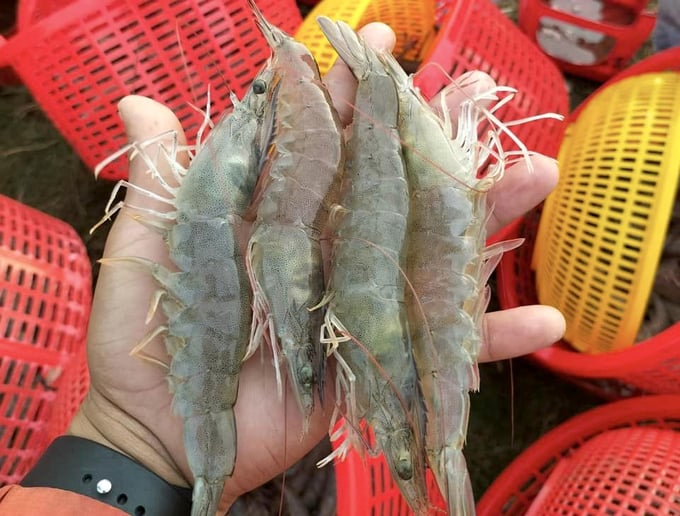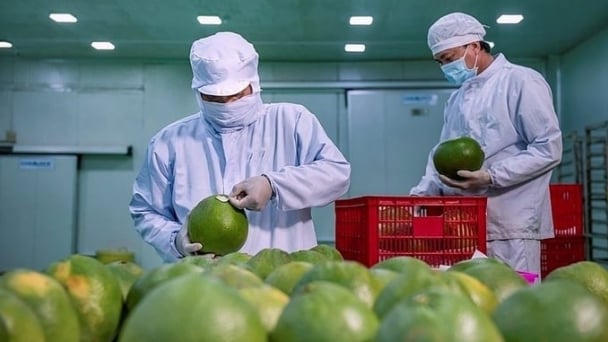May 14, 2025 | 07:52 GMT +7
May 14, 2025 | 07:52 GMT +7
Hotline: 0913.378.918
May 14, 2025 | 07:52 GMT +7
Hotline: 0913.378.918

Vietnamese shrimp is currently facing a "double lawsuit" in the U.S. market. Photo: Son Trang.
At a recent trade promotion conference titled "Recommendations regarding countervailing Investigations on exports from Vietnam", organized by the Ministry of Industry and Trade, Mrs. To Tuong Lan, Deputy General Secretary of the Vietnam Association of Seafood Processing and Exporting (VASEP), highlighted that Vietnam has successfully exported seafood to over 170 markets worldwide. Despite this extensive reach, the Vietnamese seafood industry has primarily encountered anti-dumping and countervailing lawsuits exclusively in the U.S. market.
For over two decades, the Vietnamese seafood sector has consistently faced anti-dumping cases in the United States, with two main export products - shrimp and catfish - being significantly affected. Recently, the situation has become more complicated for the Vietnamese shrimp industry, which is now also dealing with a new countervailing lawsuit. This lawsuit pertains to warm-water shrimp, whether sourced from wild fisheries or aquaculture, being imported from Vietnam as well as other countries such as Ecuador, India and Indonesia into the U.S. market.
The anti-dumping and countervailing lawsuits have created significant difficulties for Vietnamese companies exporting shrimp and catfish to the U.S. in recent years. However, according to Mrs. To Tuong Lan, Deputy General Secretary of the Vietnam Association of Seafood Processing and Exporting (VASEP), there is a positive side to these challenges: they have contributed to the maturation and development of Vietnamese seafood enterprises. Each year, these businesses have shown remarkable growth and resilience in adapting to the evolving market landscape.
As a result, despite facing anti-dumping cases year after year and, more recently, a countervailing lawsuit concerning shrimp, the trend of Vietnamese seafood exports to the U.S. has remained upward over the past two decades. The United States continues to be the largest market for Vietnamese seafood products. In 2023, the total value of seafood exports to the U.S. reached an impressive 1.6 billion USD. Furthermore, in the first nine months of this year alone, exports amounted to 1.3 billion USD, reflecting a significant 14.2% increase compared to the same period last year.
Catfish was the first seafood product from Vietnam to face anti-dumping lawsuits in the U.S. By the end of 2023, Vietnamese catfish and basa imported into the U.S. were subjected to anti-dumping duties. After more than 20 years, Vietnam remains the largest exporter of catfish to the U.S. In 2023, the U.S. imported nearly 92.000 tons of frozen catfish, with Vietnam accounting for 91% of this total, while the remaining 9% came from Thailand and China.

A catfish farming pond in the Mekong Delta. Photo: Son Trang.
The United States has consistently ranked among the largest markets for Vietnamese catfish. From the beginning of the year to mid-September 2024, catfish exports to the U.S. reached an impressive 240 million USD, marking a significant 23% increase compared to the same period in 2023.
Following catfish, Vietnamese shrimp also entered a complex legal landscape in the U.S. when anti-dumping duties were imposed in 2004. More recently, on April 2, 2024, the U.S. introduced preliminary countervailing duties on warm-water shrimp imported from four countries: Vietnam, Ecuador, India, and Indonesia. This situation means that Vietnamese shrimp exports to the U.S. are currently facing a "double lawsuit".
Despite these legal challenges, Vietnam remains the top supplier of shrimp to the U.S. In 2023, the U.S. imported a total of 788.000 tons of shrimp, with 62.000 tons coming from Vietnam, making it the fourth largest source of shrimp for the U.S. market.
For many years, the U.S. has consistently been the largest market for Vietnamese shrimp. From January 1 to September 15, 2024, shrimp exports from Vietnam to the U.S. reached 516 million USD, marking an 8% increase compared to the same period last year.
Mrs. To Tuong Lan noted that currently, warm-water shrimp from Vietnam, Ecuador, India, and Indonesia imported into the U.S. are subject to anti-dumping duties as part of the 18th administrative review (POR18) conducted by the U.S. Department of Commerce. The anti-dumping duty for Vietnamese shrimp is set at 0%, while the rates for other countries are as follows: Ecuador at 10.18%, Indonesia at 6.3%, and India at 3.88%.
In addition to the anti-dumping duties, Vietnamese shrimp and the aforementioned countries are also facing anti-subsidy taxes. Anti-subsidy taxes on Vietnamese shrimp is 2.84%, while for Ecuador, it is 2.89%; for Indonesia, it is 0%; and for India, it is 4.36%. When combining both types of duties, Vietnamese shrimp imported into the U.S. is subject to a total duty of 2.84%, while Ecuador faces a total of 13.07%, Indonesia has 6.3%, and India is at 8.24%.
In September 2024, the U.S. Department of Commerce announced the preliminary results of the 20th administrative review (POR20) on anti-dumping measures concerning Vietnamese catfish. Accordingly, both mandatory respondents were assigned an anti-dumping duty rate of 0%, while the remaining six companies also received a separate duty rate of 0%. Mrs. To Tuong Lan commented that this has created a positive momentum for catfish exports to the U.S.
Translated by Phuong Linh

(VAN) U.S. tariffs are not only a 'shock', but also an opportunity for Vietnamese businesses to renew their mindset toward comprehensive development.

(VAN) As Bac Giang lychee enters the harvest season, Minister Do Duc Duy expects that the fruit will contribute greatly to agricultural exports due to standardized production and deep processing.

(VAN) Consumers have shown a preference for free-range eggs, but those farming systems are more vulnerable to biosecurity risks like bird flu.
/2025/05/09/5701-1-184335_301.jpg)
(VAN) Vietnam’s eel exports nearly doubled thanks to a mud-free farming model, opening up new prospects while still facing numerous barriers related to international standards.

(VAN) Minister Do Duc Duy warned that if production is not professionalized and supply chains are not transparent, the U.S. market could become a growth bottleneck.

(VAN) Delegating surveillance responsibilities to local authorities is a cost-saving and efficiency-boosting measure that removes a key bottleneck for enterprises, according to Director General Duong Tat Thang.

(VAN) Australia's final report on biosecurity has just been released, contributing to expanding the market for Vietnam's fruit with an output of nearly 1 million tons.